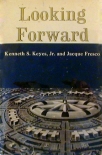Looking Forward by Kenneth Jr. (reading diary .txt) 📕

Read free book «Looking Forward by Kenneth Jr. (reading diary .txt) 📕» - read online or download for free at americanlibrarybooks.com
- Author: Kenneth Jr.
Read book online «Looking Forward by Kenneth Jr. (reading diary .txt) 📕». Author - Kenneth Jr.
Eight months ago the Correlation Center selected Scott and medical scientists from Asia, South America, and Europe to conduct experiments and report on the desirability of increasing the sensitivity of the humans near to 30,000 cycles. Human hearing is limited to a range of about 20 to 20,000 cycles per second. Some animals, such as dogs, can hear higher-pitched sounds. If Scott’s committee feels that human well-being would be increased by an addition to the auditory range, research will be conducted toward this end. They already know which DNA manipulation are needed to produce the higher range of hearing. Perhaps in five years a pilot study with 1,000 individuals in different parts of the earth will be tried. If a richer pattern of life results, perhaps 5 per cent of the infants will be so equipped. If results continue to be favorable, this genetic improvement may be generally adopted for future babies of the twenty-second century. If there is any question about the feasibility of a projected improvement, or if difficulties later arise, the flexible scientific attitude results in rapid corrections. Nothing is regarded as final.
During his lifetime Scott knew people who were born in the twentieth century. He considered them “culture-bound.” They were so bewildered by the flexibility of the new generations! They kept saying, “It isn’t right to do this. If nature had wanted things that way, she would have made them that way. You have no respect for truth.” Scott believes that the test of all things is the happiness they yield. He knows that mental straight-jackets limit one’s ability to work out patterns of life that are broadly fulfilling.
Perhaps for the first time in human history, people are not bound tightly by the forms of a culture. In the past individuals who did not observe the mores of their particular culture were subjected to penalties that varied from disapproval to death. Scott’s generation encourages diversity; they try to avoid getting into personal or social ruts.
In the nurseries children enjoy games that help develop complete flexibility in going from one system to another. They know that two plus two in many situations equals four. They do not want to be rigidly bound by this. They want to know the hidden assumptions that lie behind this “self-evident” formula. Children enjoy finding ways in which two plus two is not equal to four. Much of life is not additive. If two mouthfuls of a food are pleasant, it does not follow that four mouthfuls will give twice as much pleasure. The pleasure may decrease even more with six mouthfuls. Twelve mouthfuls might be unpleasant. “I remember once discovering a life situation in which two plus two equaled zero,” Scott says.
The free minds of the twenty-first century challenge everything that seems self-evident. They like to try on mentally different points of view. They search for their hidden assumptions and delight in bringing them to the surface. They are experts at changing their minds. “There are many people I especially like because they do not share my points of view,” Hella says. “I enjoy talking with them when they vigorously defend a position that contradicts mine. I know I learn more when I find people with ideas that challenge mine.”
The Morning: Conference
Hella enjoys studying human relationships. She has asked the Correlation Center to indicate useful things she can do. She has been appointed to a committee that is studying the degree to which privacy in living areas adds or detracts from the human happiness potential. They are gathering data on what proportions of the population seem to achieve maximum fulfillment in those apartments that offer privacy versus those apartments that are shared by varying numbers of people. There is some evidence that self-selected groups of six people offer greater conversational variety, increased vicarious appreciations, and significantly enriched intellectual, esthetic, and sensory experiences. Larger groups may have a degree of superficiality and confusion that has drawbacks.
It is recognized that if each individual is to have a maximum of “Life, Liberty, and the Pursuit of Happiness,” there must be opportunities from full privacy to full community participation in all activities. One should be able to choose whatever meets his needs best at the time. All planning is determined by the varied and changing preferences of individuals, not by what someone else thinks is “good for them.”
Both Scott and Hella plan to confer with their respective colleagues on these scientific matters during the latter part of the morning. At the prearranged time the telescreens come to life. Scott in his portion of the room and Hella in hers talk with their associates throughout the world. A table is in the foreground of the screen and the people appear in the far-flung conference telescreens as though seated in a semicircle.
At one point in Scott’s conference it is necessary to telecommunicate with a scientist on a space station. Later, they need the results of an experiment on hearing conducted eighty years previously. A request is made of the Correlation Center for this information. Within moments the data is presented upon the screen. The Correlation Center has recorded every book, document, and report that has ever been preserved in the history of the world. This information—classified, cross referenced, summarized, and evaluated—is available at all times. The proceedings of this conference are also recorded into the vast memory banks of the Correlation Center.
After their conferences Scott and Hella leave the main living area. Their chairs silently fold away and retract into the floor. They return to the balcony and recline upon a huge circular surface which automatically contours itself to their bodies and orients





Comments (0)